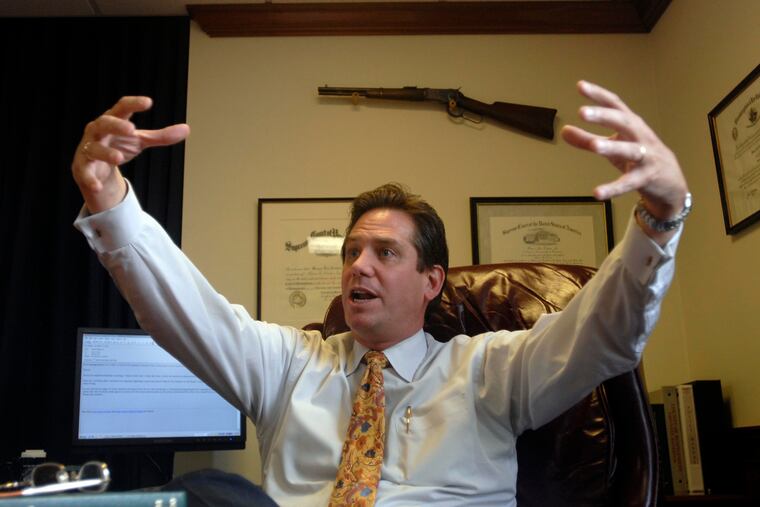With former Montco DA Bruce Castor poised to represent Trump, prepare for a rollercoaster ride | Opinion
After covering the former Montco DA for more than two decades, I know how alike Castor and former President Trump are — if for no other reason than their contentious relationships with the press.

When I learned that former Montgomery County District Attorney Bruce L. Castor Jr. was part of former President Donald Trump’s new legal team, I just shook my head and thought, “Of course he is.” Castor, who has been a Montgomery County commissioner, Pennsylvania’s solicitor general, and, briefly, acting attorney general, is most famous for not prosecuting Bill Cosby in 2005, and seems to have more professional resurrections than a cat has lives. He’s a well-known player in state and local politics and always seems to surface when you least expect it.
I couldn’t help but think how alike Castor and former President Trump are, if for no other reason than their contentious relationships with the press. Both relish being the center of media attention but bristle under the scrutiny that attention brings them. Yet Castor is willing to subject himself to that scrutiny time and again because he loves the limelight, no matter how much its glare exposes his own flaws.
It’s impossible to predict how Castor’s relationship with Trump — and the legal proceedings — will play out or how well he’ll click with David Schoen, Trump’s other attorney, but as someone who covered Castor as a journalist for many years, I know that wherever he goes, controversy follows and, given the strong personalities of both men, this situation could get very interesting.
» READ MORE: 5 things to know about Bruce Castor, the Montgomery County lawyer now repping Donald Trump
I first got to know Castor back in the late 1990s, when he was then-Montgomery County District Attorney Mike Marino’s first assistant and I was a reporter for the Philadelphia Daily News. I always seemed to be assigned to call him after hours when we’d missed one of their news conferences, so he was never very happy to hear from me and never shy about letting me know.
He vowed to stop talking to me for good in 2001 after I questioned him about how he handled a sticky situation involving the son of a federal judge. Thirteen years later, he actually sent me an email reminding me of that pledge when I reached out to him for a comment for a story.
Despite being shut out by Castor, I kept covering criminal cases in Montgomery County — and there were plenty of them. Then came the biggest story of all: In January 2005, Bill Cosby was accused of drugging and sexually assaulting former Temple University employee Andrea Constand, a headline-grabbing case if ever there was one, and one I worked on from the very beginning for the Daily News and later People magazine.
Castor was uncharacteristically silent at first. When he finally did speak, he made it clear how flawed he thought the case against “America’s Dad” was and treated Constand more like a suspect than a victim throughout the investigation. When I reported that Constand had taped phone calls that proved she was telling the truth and that she hadn’t accepted Cosby’s offer of financial compensation, he told reporters he could have me arrested for writing about these “illegal wiretaps,” as he insisted on calling them, though they weren’t illegal and later became evidence in both of Cosby’s trials. Castor even called into Michael Smerconish’s radio show when Smerconish invited me on to talk about my exclusive interview with a second accuser, California attorney Tamara Green, and proceeded to lash out at me. (You can hear part of that call at the end of episode one of my podcast based on my book, Chasing Cosby.)
In his new role as Trump’s lawyer, Castor will face the national media Trump has been tangling with for years, and let’s just say he hasn’t always handled that type of attention very well.
After Cosby was charged with Constand’s sexual assault in 2015 (the same case Castor declined to prosecute in 2005), reporters wanted to get Castor’s reaction, but he wasn’t talking, so one intrepid reporter decided to try to track him down at his home. It’s something journalists do all the time in the course of doing our jobs, but apparently it was the “first time in 30 years of public life” (his words) it had happened to Castor and he was not happy about it. He posted a warning on his public Facebook page, saying any reporter who went to his home without an invitation “quite literally takes his life into his own hands. The reporter will never know the danger he was in. … So reporters: … never even consider coming to our house uninvited, especially on a work day when my wife is alone, except for Mr. Ruger.” (For those unfamiliar with guns, a Ruger is a firearm.)
It was a shocking tirade, even for him, but Castor loves the media when he can control what they’re doing and reporting and, well, you see what happens when he can’t.
I’m guessing that’s a trait that has endeared him to Trump.
With Castor’s history of clashing with Republicans and Democrats alike (a Harrisburg Patriot-News’ article summed up Castor’s history nicely in an article with the headline “Everybody hates Bruce Castor and the acting attorney general doesn’t care”) the new partnership between Castor and Trump, not to mention his co-counsel, could be a bit of a roller coaster ride. I would love to ask Castor how he thinks it will go, but I’m pretty sure he’s still not speaking to me.
Nicole Weisensee Egan is an investigative journalist, author of Chasing Cosby, host and executive producer of the podcast based on the book and the coauthor of Victim F, due out in June. To see more of her work go to NicoleWeisenseeEgan.com.